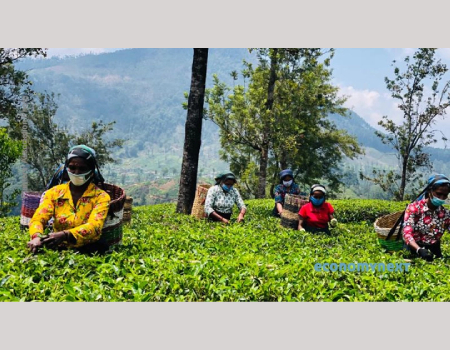
Please Share your Email if you Wish to Receive the Golden Tips & Tales Newsletter from History of Ceylon Tea Website

Sri Lanka is planning to bring a law re-nationalize land in privatized tea farms according to plan proposed by ex-President Gotabaya Rajapaksa, Minister of Plantation Industries and Minister of Industries Ramesh Pathirana said.
“Former President Gotabaya Rajapaksa brought a proposal to the cabinet and approved to take back the under-utilized land to the government,” he told the parliament on Tuesday replying opposition member Vadivel Suresh to expropriate lands and give them to workers.
“The bill has been sent to the legal draftsman, and the law must be implemented and it has to be passed in parliament”
“We will also vote with both hands to take back this lands to the government”.
The plantation companies had 70,000 hectares, legislator Suresh said.
“There are 1.5 million plantation sector people. From the official 25 districts, the plantations sector people are in 10 districts.
“All these lands are run by three business man. When these people got into agreements with the government, were the plantation sector workers also included in that?”
Minister Pathirana said 13,900 hectares were already taken over from the privatized plantations for public purposes from the originally privatized plantations.
Sri Lanka is planning to expropriate private property despite suffering the worst currency crisis in history and defaulting on foreign loans amid low growth and money printing.
Sri Lanka had some of the highest living standards at independence in 1948 with monetary stability coming through a currency board and a history of foreign direct investment especially into tea and rubber.
After independence, the plantations were expropriated both from foreign and domestic investors violating their property rights.
Many investors in tea fled to Kenya who gave land for them, as Zimbabwe farmers were given land in neighboring nations to grow maize.
Sri Lanka has since then found it difficult to attract foreign investors and the then president J R Jayewardena put in a constitutional clause to stop expropriation in a bid to stop elected ruling class from expropriating private property.
The ruling class mis-used to powers that came to them from a parliament set up by the British rulers to expropriation citizens and non-citizens and undermined the investment safety in the island.
While un-armed public can fight ordinary thieves who come to rob their property, they are helpless when the state engages in the same activity, freedom advocates say.
But 2011 Sri Lanka’s elected ruling class expropriated several foreign and domestic businesses through an ad hominem law and also blocked judicial review in a shocking violation of the separation of powers between the legislature and judiciary.
The claim was that the property was ‘underutilized’.
Pathirana claimed the plantations lands were also underutilized.
“In President Premadasa’s time these lands were given to these firms through a very weak agreement,” he claimed.
“The 70,000 hectare that is owned by these firms are being neglected. Replanting is not doe. His (Vadivel’s) requests are fair.
From 1992 the plantations were privatized because they were making losses and people’s taxes were being used to pay salaries.
After privatization under long leases, the firms have paid lease rentals and taxes to the government.
Suresh said plantations companies had 75 percent of the tea land in the country and produced only a fraction of the tea made by small holders.
Plantations firm in turn had said that they were trying to put in place the same models used by small holders to improve productivity but a change in work practices are resisted by trade unions.
Plantations manages have said any unused lands are in inaccessible areas and some of the lands given for public purposes are prime land bordering roadways.
Some land given to local authorities are lying unused, they have claimed.
Meanwhile Suresh said the estate Tamil community did not join the Tamil Tiger separatists nor the 1980s JVP struggles, but had always stood beside the country to strengthen the economy
“When the war was happening, these plantation sector people did not support the LTTE,” he said. “They were with Sri Lankans. Even during JVP issues they were with the government. Even during the Covid they worked every day. Yet for 200 years, for 6 generations we are suffering,”
“The President is talking about food security. But how can we achieve food security if this is the situation,”
“We are only asking to be considered as Sri Lankans and we are ready to strengthen the economy.”
The Speaker of the Parliament, Mahinda Yapa Abeywardena said he was also in favor of re-exporpriating the land government.
Source: https://economynext.com/sri-lanka-expropriation-drums-beat-loud-over-privatized-tea-farms-109445/
Comments
(In keeping with the objectives of this website, all COMMENTS must be made in the spirit of contributing to the history of this estate, planter or person i.e. names, dates & anecdotes. Critical evaluations or adverse comments of any sort are not acceptable and will be deleted without notice – read full Comments Policy here)